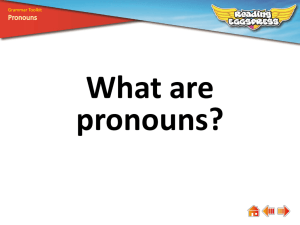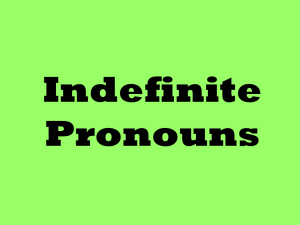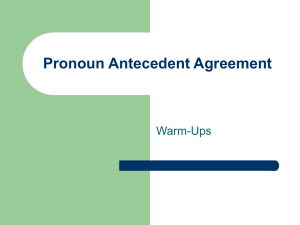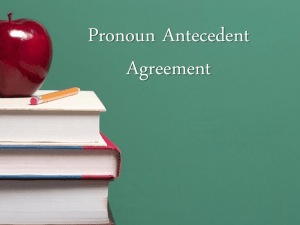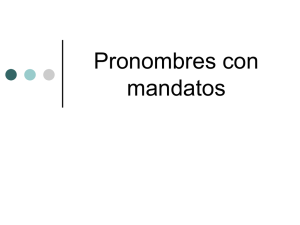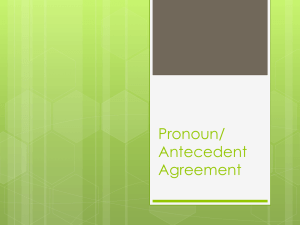File
advertisement
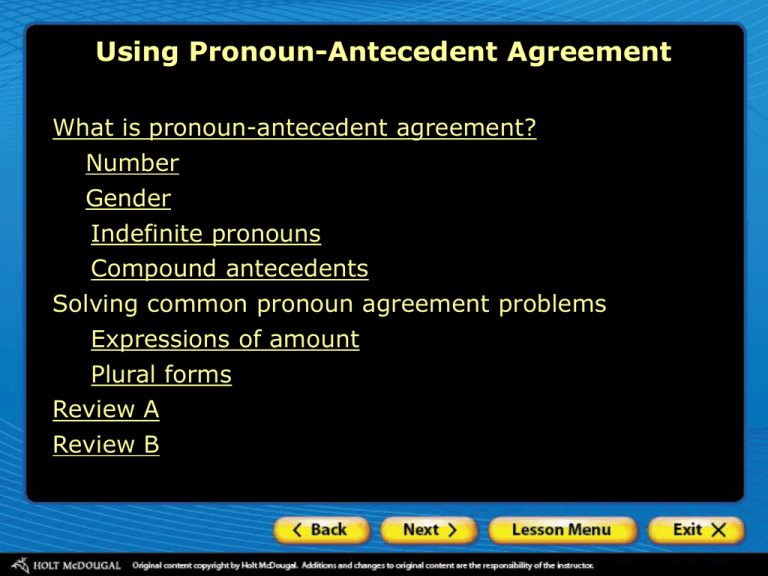
Using Pronoun-Antecedent Agreement What is pronoun-antecedent agreement? Number Gender Indefinite pronouns Compound antecedents Solving common pronoun agreement problems Expressions of amount Plural forms Review A Review B What is pronoun-antecedent agreement? You may have heard that it is rude to point, but that’s exactly what pronouns do. A pronoun “points” to a noun or another pronoun called its antecedent. Antecedent Pronoun Carrie explained she had forgotten. Carrie explained that thatshe shehad hadforgotten. forgotten. When a pronoun and its antecedent do not agree, listeners and readers become lost. What is pronoun-antecedent agreement? Number A pronoun should agree in both number and gender with its antecedent. A word that refers to one thing is singular. A word that refers to more than one is plural. SINGULAR PLURAL dogs dog man men they she What is pronoun-antecedent agreement? Number Use singular pronouns to refer to singular antecedents. Singular Antecedent Singular Pronoun Close the door door and and lock lock it. it. it. Singular Personal Pronouns I me my, mine you you your, yours he, she, it him, her, it his, hers, its What is pronoun-antecedent agreement? Number Use plural pronouns to refer to plural antecedents. Plural Antecedent Plural Pronoun Open the blinds blinds and andraise raisethem. them. them. Plural Personal Pronouns we us our, ours you you your, yours they them their, theirs What is pronoun-antecedent agreement? Gender Some singular pronouns indicate gender. • Masculine pronouns refer to males. • Feminine pronouns refer to females. • Neuter pronouns refer to places, things, ideas, and animals. Masculine Feminine Neuter he she it him her it his her, hers its himself herself itself What is pronoun-antecedent agreement? Indefinite pronouns Indefinite pronouns refer to a person or thing whose exact identity is unknown. • Some indefinite pronouns are singular. • Some are plural. • Some may be either singular or plural depending on how they are used. What is pronoun-antecedent agreement? Indefinite pronouns The following indefinite pronouns are singular: Singular Indefinite Pronouns anybody either neither one anyone everybody nobody somebody anything everyone no one someone each everything nothing something Eachof Everybody One ofthe theboys in teams the left girls’ had hisits league pen mascot behind. paidather thedues. game. What is pronoun-antecedent agreement? Indefinite pronouns The following indefinite pronouns are plural: Plural Indefinite Pronouns both few many several Both of the sisters recited their lines. Few of the animals recognized themselves. If many are ripe, pick them. What is pronoun-antecedent agreement? Indefinite pronouns The following indefinite pronouns may be singular or plural, depending on how they are used: Singular or Plural Indefinite Pronouns all more none any most some Singular Most of the movie is over. Should I restart it? Plural Most of these films are new. Have you seen them? What is pronoun-antecedent agreement? Indefinite pronouns On Your Own The following sentences contain errors in pronounantecedent agreement. Identify each error, and give the form of the pronoun that agrees with its antecedent. 1. Each of the boys built their own computer. 2. Few of the butterflies reach the end of its migration. 3. We saw only some of the city as we drove through them. 4. If someone arrives early, they should wait by the door. 5. None of the actors had memorized his or her lines. [End of Section] What is pronoun-antecedent agreement? Compound antecedents A compound antecedent is two or more antecedents joined by and or or. • Use a plural pronoun to refer to two or more antecedents joined by and. Antecedent 1 Antecedent 2 Nina Paul and Antecedent 1 The car and the drew pictures of themselves. Antecedent 2 truck honked their horns. What is pronoun-antecedent agreement? Compound antecedents • Use a singular pronoun to refer to two or more singular antecedents joined by or or nor. Singular Paula Singular or Janet Singular Neither Max will present her views. Singular nor Pablo said that he would. What is pronoun-antecedent agreement? Compound antecedents On Your Own Most of the following sentences contain pronouns that do not agree with their antecedents. If a pronoun does not agree with its antecedent, provide the correct pronoun. If a sentence is already correct, write C. 1. Both Wanda and Sam were pleased with herself. 2. A fly or a bee can enter the plant, but they cannot escape. 3. This plate and cup bear the mark of its maker. 4. Neither Bill nor Andy think that the coat is theirs. 5. I do not expect fame or reward but would welcome it. [End of Section] Special problems in pronoun agreement Expressions of amount An expression of amount (a measurement, percentage, or fraction) may be singular or plural, depending on how it is used. An expression of amount is • singular when the amount is thought of as a unit. Here is five dollars. Is it enough? • plural when the amount is thought of as separate parts. Five dollars were counterfeit, weren’t they? Special problems in pronoun agreement Expressions of amount A fraction or a percentage is • singular when it refers to a singular word. This farmer has set aside ten percent of his land and agreed to let it go wild. • plural when it refers to a plural word. This farmer has set aside ten percent of his fields and agreed to let them go wild. Special problems in pronoun agreement Plural forms Some nouns that are plural in form take singular pronouns. Plural Forms That Take Singular Pronouns civics gymnastics molasses economics linguistics mumps electronics mathematics news genetics measles physics This Iarticle have good is about news. genetics Do you and want how toithear has it? grown. Special problems in pronoun agreement Plural forms Even when plural in form, these types of nouns take singular pronouns: • titles of a creative work—books, songs, movies, or paintings After Chad read Mules and Men, he wrote report on it. • names of countries, cities, or organizations Hot Springs, Arkansas, is famous for its popular health resort. Special problems in pronoun agreement Expressions of amount / Plural forms On Your Own Most of the following sentences contain pronouns that do not agree with their antecedents. If a pronoun does not agree with its antecedent, provide the correct pronoun. If a sentence is already correct, write C. 1. Grand Forks is in North Dakota. Did you drive through them on your trip? 2. Fifty percent of the wall has received its last coat of paint. 3. The chart explains mumps and how people catch them. 4. The speaker talked about mathematics and why we should study them. 5. Nine tenths of the employees had driven him- or herself to work. [End of Section] Review A Complete each sentence by providing pronouns that agree with their antecedents. 1. I like this painting, but ________ is not my favorite. 2. Both of the accused men deserve ________ day in court. 3. No one in the hiking group left ________ trash behind. 4. Brad and Janet took a wrong turn, and __________ had to ask for directions. 5. If the transmission or the drive shaft is causing the problem, you may have to replace ________. Review B The following sentences contain errors in pronounantecedent agreement. Identify each error, and give the form of the pronoun that agrees with its antecedent. 1. If you find any of the puzzle pieces, please save it. 2. The Future Farmers of America has a list of upcoming events on their Web site. 3. Paul studies physics because he enjoys them. 4. Three eighths of the plants have grown since we measured it last week. 5. Everyone signed their name at the bottom of the mural. [End of Section] The End



